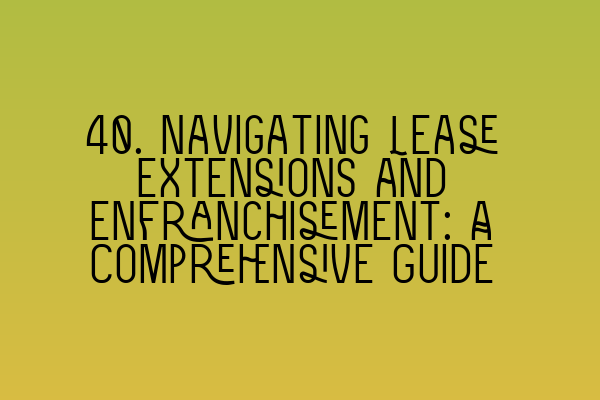**40. Navigating Lease Extensions and Enfranchisement: A Comprehensive Guide**
Are you a leaseholder looking to extend the lease on your property? Or perhaps you are a freeholder considering enfranchisement? Whatever your situation may be, understanding the intricacies of lease extensions and enfranchisement is crucial. In this comprehensive guide, we will navigate you through the ins and outs of lease extensions and enfranchisement, providing you with valuable insights and guidance.
Before we delve into the details, it is important to clarify the definitions of lease extensions and enfranchisement.
**Lease Extensions**
When you own a leasehold property, you essentially have a long-term lease with a specified duration. As the lease term dwindles, the value of your property may be affected, making it essential to consider a lease extension. A lease extension allows the leaseholder to extend the lease term, thereby safeguarding the value of their property and providing peace of mind.
Now, let’s explore the key aspects of lease extensions:
**1. Qualification Criteria**
To be eligible for a lease extension, you must meet certain criteria. Generally, you must have owned the property for at least two years and the original lease term must have been for more than 21 years. It is important to note that these criteria may vary depending on the specific circumstances, so it is advisable to seek professional advice.
**2. The Lease Extension Process**
The lease extension process can be complex, involving legal documentation and negotiations. It is crucial to seek the assistance of a qualified solicitor who specializes in property law to guide you through this process. They will help you with the required notices, valuation, and negotiations with the freeholder.
**3. Valuation**
Determining the premium for a lease extension can be a contentious issue. The premium is essentially the price you pay to extend the lease. Factors such as the length of the lease remaining, the property’s value, and current market conditions all influence the valuation. Hiring a professional surveyor who specializes in lease extensions is recommended to ensure a fair and accurate valuation.
**4. Statutory versus Informal Lease Extensions**
There are two types of lease extensions: statutory and informal. A statutory lease extension is governed by the Leasehold Reform, Housing, and Urban Development Act 1993. This legislation provides leaseholders with certain rights and protections in the lease extension process, including the ability to extend the lease term by 90 years and a peppercorn ground rent (a nominal rent). An informal lease extension, on the other hand, is negotiated between the leaseholder and the freeholder without the involvement of legislation.
**Enfranchisement**
Enfranchisement refers to the process where leaseholders collectively purchase the freehold of their building. This provides leaseholders with greater control and ownership over their property, eliminating the need to pay ground rent and allowing more flexibility in managing the property.
Here are the key aspects of enfranchisement:
**1. The Right to Enfranchise**
To exercise the right to enfranchise, certain conditions must be met. Generally, the building must contain at least two flats, with at least two-thirds of the flats being held by qualifying leaseholders. It is important to carefully review the eligibility criteria to ensure you meet the requirements.
**2. Collective Enfranchisement**
Collective enfranchisement allows leaseholders to collectively acquire the freehold of their building. This process involves several steps, including serving a formal notice, obtaining a valuation of the freehold, and negotiating the terms of acquisition with the freeholder. Again, seeking the expertise of a property law specialist is essential to navigate through this multifaceted process.
**3. Individual Enfranchisement**
Individual enfranchisement is an alternative to collective enfranchisement for leaseholders who do not meet the eligibility criteria or prefer to acquire the freehold individually. The process entails serving a notice on the freeholder, obtaining a valuation, and negotiating the purchase price. As always, seeking professional advice is highly recommended.
**Conclusion**
Lease extensions and enfranchisement are complex areas of property law that require careful consideration and expert guidance. By understanding the qualification criteria, the process involved, and seeking professional assistance, you can navigate through these legal procedures with confidence.
At SQE Property Law & Land Law, we specialize in providing comprehensive legal advice on lease extensions, enfranchisement, and all aspects of property law. Contact us today to speak with our experienced solicitors who can guide you through the intricacies of lease extensions and enfranchisement.
Related Articles:
– [SQE 1 Practice Exam Questions](https://fqps.co.uk/sqe/sqe1-preparation/mcq-practice-quiz)
– [SQE 1 Practice Mocks FLK1 FLK2](https://fqps.co.uk/sqe/sqe1-preparation/practice-mocks-quiz)
– [SQE 2 Preparation Courses](https://fqps.co.uk/sqe/sqe2-preparation)
– [SQE 1 Preparation Courses](https://fqps.co.uk/sqe/sqe1-preparation)
– [SRA SQE Exam Dates](https://fqps.co.uk/sqe/sqe1-sqe2-exam-dates)
